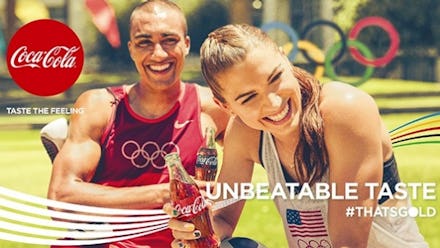Coke Is Using the Rio Olympics to Target Latinos — And It's a Huge Problem

Food advertisers are thirsty for attention during the Olympic Games, and a recent interview with a Coca-Cola spokesperson reveals that the brand is targeting Hispanics with its #ThatsGold campaign.
In an interview with Portada-Online, associate brand manager Melissa Palacios said that the #ThatsGold campaign will include themes of positivity and inclusiveness because "... more than other ethnic groups, Hispanics are particularly interested in the potential underdog stories, those stories of hard work and success."
The problem: Coke isn't celebrating Hispanics or the variety of cultures in the Olympics, the company is currying good favor with specific populations. The goal? To gain lifelong Coke addicts — ahem, consumers.
Fact: Junk food marketers disproportionally target minorities
Black and Hispanic communities have a high rate of obesity and they're frequently targeted by junk food marketers.
Published in August 2015, a report from the Rudd Center for Food Policy & Obesity at the University of Connecticut revealed that companies spend billions to reach these minority populations. Black kids and teens viewed 70% more food-related TV commercials, and watched twice as many ads for gum and soda compared to white kids and teens, the report found.
"These companies all say they have practices for responsible marketing to children in black and Latino communities, but it's not very responsible to be marketing products that are so detrimental to them," Jennifer Harris, director of marketing initiatives at the Yale Rudd Center and lead author of the report, told NPR.
Coke didn't always target Black and Hispanic population
"For decades, Black and Hispanic groups held demonstrations and urged boycotts to demand that soda companies hire them and advertise in their publications," Marion Nestle, Professor, Department of Nutrition, Food Studies, & Public Health, New York University, said in an email.
Get this: The night before Martin Luther King Jr. was assassinated in 1968, he implored his supporters to boycott Coca-Cola because it had white-only hiring practices, Nestle said. In the following decades, the company made concerted efforts to hire more diversely — by 1980, 24% of its workforce was African-American, the Washington Post noted. The company also made donations to the NAACP and historically black colleges.
Despite these feel-good deeds, Coke continuously underpaid black and female employees and those discriminatory practices led to the biggest racial discrimination case and a $156 million settlement in 2000, the New York Times reported.
But all in all, Coke's success marketing to and hiring minorities induced brand loyalty, Nestle said. According to a Centers for Disease and Control study, consumption of fruit drinks and soda is disproportionally high among black people and Hispanics. Roughly 20% and 23% of non-Hispanic black adults and Hispanic adults, respectively, said they drank at least once a day.
Exploitation masked as inclusivity
Coca-Cola and other junk food marketers couch multicultural marketing in positivity — they make it seem as though minorities should be flattered that they have rising economic and social status.
In 2012, Ad Age published an article titled "Hats Off to the Soft-Drink Industry for Giving Attention to Hispanics and Blacks." In the article, David Morse, a multicultural marketer for big soft drink companies, wrote that multicultural marketing is about demonstrating that companies care about business with minorities.
"As a multicultural marketer, I applaud the leadership of the soft-drink industry in recognizing the changing face of America," Morse wrote.
But such targeted marketing isn't flattery, it's straight up exploitation.
Coke and other big soda companies are using the same strategies that cigarette marketers used to seek favor with minorities. In decades past, the tobacco industry marketed menthol cigarettes to Black communities with the goal of increasing business, the Berkeley Media Studies Group reported. The CDC noted that many companies used urban language and culture to market tobacco.
Just check out this ad for Kool menthol cigarettes, featuring a black man and woman. According to Black Quotidian, a digital project that highlights the history of black newspapers, the ad pictured below was published in the Baltimore Afro-American, a weekly newspaper, in 1964.
And surprise, Coke also has a history of advertising in black media. A black model named Mary Alexander was featured in a variety of ads, one of which was published in Ebony in 1955, according to the Coca-Cola website.
These days, the company works to gain relevance by tapping into pop culture and cultural identities. Just take a look at the #ShareaCoke campaign — which features pop lyrics on Coke bottles — Coke is leveraging feel-good song lyrics to promote its brand. Selena Gomez, a pop star whose family has Mexican roots, is involved in the campaign, Mic previously reported.
Selena Gomez isn't alone — Plenty of Black and Hispanic sports and music figures promote big soda. Beyoncé and Sofia Vergara currently hype Pepsi while LeBron James and Penelope Cruz have promoted Sprite and Coke in the past.
Targeted marketing can be dangerous
As the Berkeley Media Studies Group noted, targeted marketing is effective: Ads that tap into what kids and teens care about have the potential to create lifelong brand loyalty. In other words, kids that get hooked on Coke early might have a hard time ditching their soda habit later on.
Drinking Coke or other sodas won't help kids become the next Beyoncé, LeBron James or Olympian, and marketing that targets Hispanics or blacks is merely a play for business. The feel-good vibes of #ThatsGold should not be synonymous with the skilled Olympians themselves, who are showing Americans, and the world, that black and Hispanic athletes are at the top of their game.
Coke has been an Olympic sponsor for 88 years. But does a sugary, caloric cola really belong at an event whose motto is "Faster, Higher, Stronger"?
In truth, Coke, and Diet Coke, makes consumers fatter, not faster. The #ThatsGold Coke campaign may celebrate perseverance and accomplishment, but the campaign doesn't come close to helping multicultural communities stay healthy.